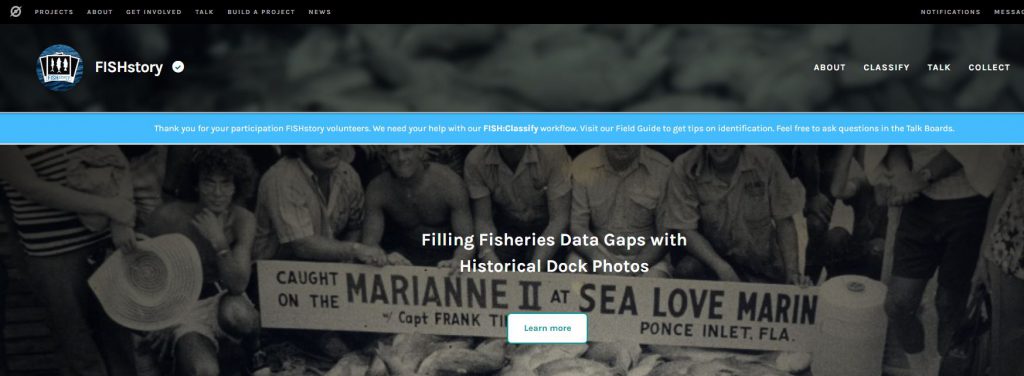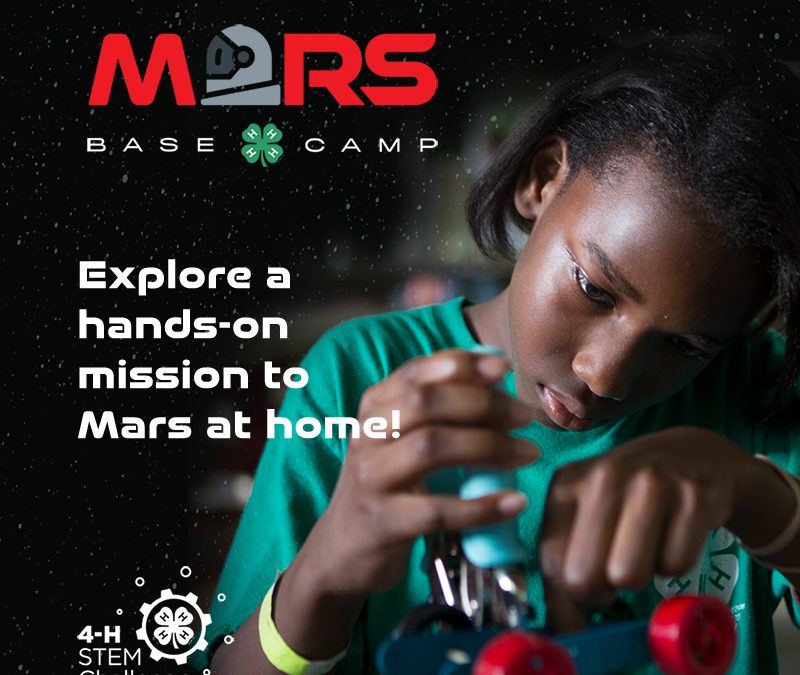
by Niki Crawson | Sep 4, 2020
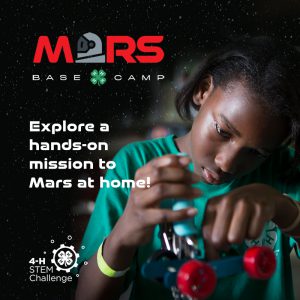
Are you ready for the Mars Base Camp Challenge?
The 4‑H STEM Challenge, formerly known as 4‑H National Youth Science Day (4‑H NYSD), is an event that we look forward to every year. In the past, this has been a single day event but now the 4-H STEM Challenge typically starts October 1 and continues throughout the month and beyond. This event is designed to ignite a spark in youth so that they take a stronger interest in science, technology, engineering and math through hands-on learning. For well over a decade, 4-H has developed creative STEM challenges to engage youth in the engineering design process and assist in the development of essential life skills such as critical thinking and problem solving through teamwork.
This year’s 4-H STEM Challenge, Mars Base Camp Challenge, was developed by Google and Virginia Cooperative Extension. The 2020 4-H STEM Challenge is designed for youth to explore the topic of a mission to Mars. The challenge is appropriate for youth ages 8-14.
Mars Base Camp Challenge consists of four activities, each of which relates to at least one of 4-H’s core areas: agriculture, STEM, healthy living and civic engagement. The four activities can be facilitated separately, together or in any combination, making it flexible to incorporate into your schedule. In addition, most of the activities do not need any form of technology, allowing for internet-free programming.
Up For The Challenge!
Feeling a little nervous about facilitating it in your club or classroom? Don’t be! You don’t need prior experience with STEM to bring Mars Base Camp to your 4-H program. All the activities have been designed to make it easy for everyone, including teen leaders to facilitate. Facilitator guides and checklists are available now to assist in the teaching process. And remember, since we use a guided approach, we give our youth direction and allow them to use their inquiry skills to find solutions through the experiential learning experience!
Mars Base Camp Challenge Resources
4-H has made the 2020 STEM Challenge accessible for everyone. If you are unable to participate in the Mars Base Camp Challenge through a club or classroom this year, youth can also participate in the challenge by way of a family kit or online. At this time, the National 4-H website is even offering $5 off each Mars Base Camp kit, thanks to the support of our 2020 national supporter, Toyota! For more information, visit https://4-h.org/parents/4-h-stem-challenge/#!2020-challenge
Online Activity: Youth can participate with INSIGHT FROM MARS, the online portion of the 2020 STEM Challenge.
Educator Kit: Includes materials for 12 youth to participate in the offline activities at the same time. Kits can be used in spaces where physical distancing can be followed.
Family-sized Kit: Includes materials for 1-4 youth to participate in the offline activities at the same time from inside the home.
We hope you enjoy your mission to Mars! To learn more about additional STEM 4-H programs and events, please contact your local UF IFAS County Extension Office, or visit http://florida4h.org.
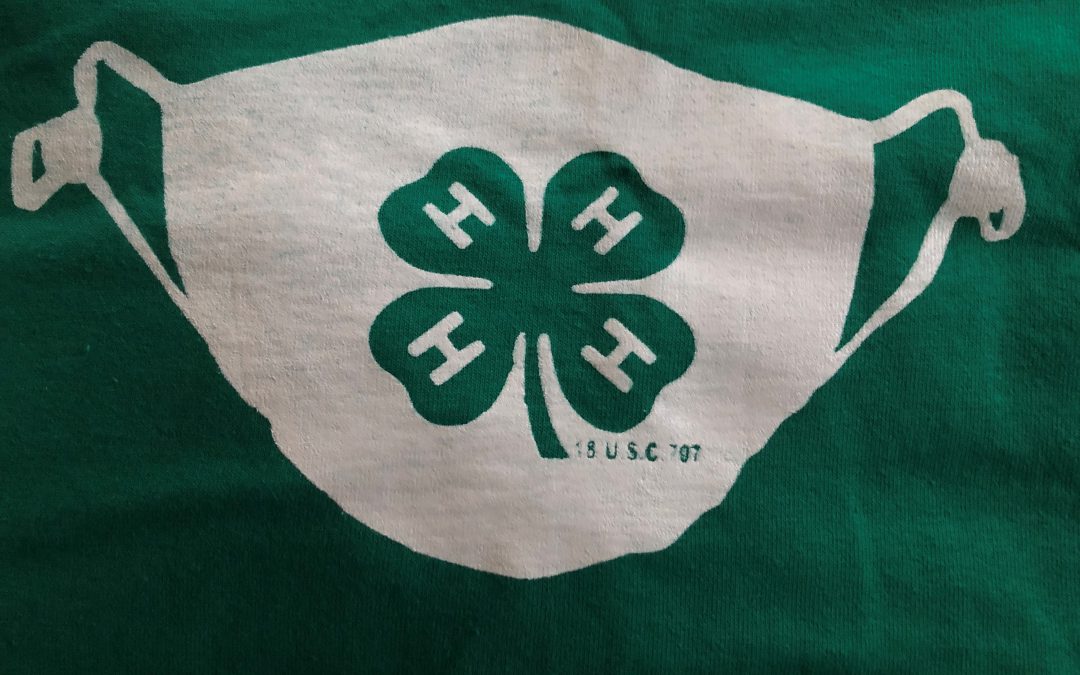
by Marie Arick | Aug 28, 2020
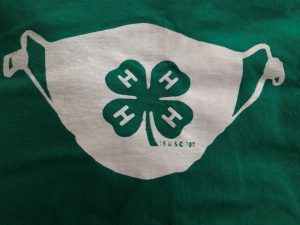
Photo credit: Marie Arick
I recently saw a meme of the Jetsons™ cartoon relating to how we are living our lives utilizing telemedicine, videocalls, online classes and our home office…how ironic. Well, 4-H has embraced these unprecedented times and is preparing to provide 4-H youth programming for the upcoming year. Nothing is more important than our youth and their health. Despite the fact things look a bit different and may require a few adjustment, such as masks, social distancing and some virtual club meetings, the 4-H Agents in the panhandle are ready for the year ahead.
While we realize that computer usage and screen time has increased due to the pandemic, it will be a part of our 4-H clubs and/or projects. Over the spring and summer months, Florida 4-H created an array of virtual summer camp experiences that taught agents we can still engage and provide wonderful learning experiences without being in person. So, we will move into the new 4-H year with our newfound tools and skills to create engaging experiences. For example, livestock and shooting sports and the associated club meetings surrounding these programs may be a hybrid of small in-person groups with safety measures and virtual meetings, but they will take place. Additionally, there will be a variety of virtual 4-H clubs offered.
Check out the list of 4-H offerings the Northwest District 4-H Agents put together for 4-H youth across the district:
#HoneyBees 4-H Club W.O.L.F. 4-H Club Baking Buddies 4-H Club Culinary Artists 4-H Club
Lead with 4-H Club Farm to Table 4-H Club Chick Chain 4-H Club Backyard Livestock 4-H Club
TailGators 4-H Club Sew Much Fun 4-H Club Range Ready 4-H Club
4-H Agents will be here to support these clubs and projects. Please understand that we will be taking extra precautions and measures to ensure all experiences, whether in person or virtually, meet all Florida 4-H requirements. We look forward to our temporary ‘new normal’ and invite you to click here to enroll in the 2020-2021 4-H year. For questions to navigate the enrollment process click here for additional information.
Unmask your child’s potential by enrolling today!
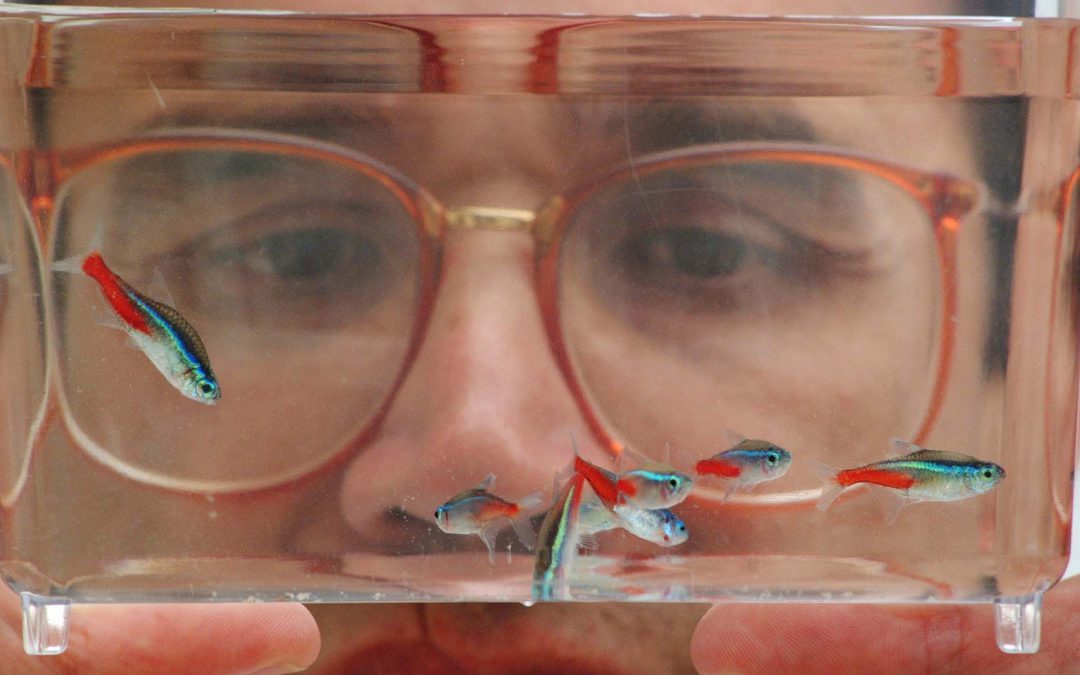
by pmdavis | Aug 7, 2020
4-H members and volunteers are always seeking new ideas for hands-on learning experiences as service activities to positively impact our communities. With covid-19, some community service opportunities have been limited due to social distancing and other restrictions. However, the South Atlantic Fishery Management Council and Florida Sea Grant have a new opportunity for 4-H members to get involved virtually. This opportunity is a citizen science project that would be a great way to build your community service hours and learn something new about fish in the process!
Are any of you into history, helping with research, and like fish? If you answered “yes” to any of these, please consider working with the FISHstory Project! The South Atlantic Fishery Management Council and Florida Sea Grant needs help with a citizen science project to help fill gaps in fisheries data using historical dock photos.
Who can participate? Families and youth ages 16+, or younger youth with an adult mentor who is working with them for the sessions. If you are under the age of 16, you will need your parent to register with you. It is a very simple registration process. First, register for FISHstory at https://scistarter.org/fishstory. Then, click on the https://safmc.net/safmc-fishstory/ link to begin helping count and identify fish in the historical photos.
This project will train you as a citizen scientist to identify and count fish using historic fishing photos from the 1940-1970s, prior to when dedicated catch monitoring began. This is a two-part project. The first part is to simply count the number of fish in the photo. The second part is to identify the fish in the photo. Everything is done online using Zooniverse, so there would be no travel or cost to participate in this project.
Data collected with your help will provide a picture of the fishery in the earlier years. This will help scientists understand the fishing industry prior to dedicated monitoring programs. It will also help improve our understanding of the fishing of several iconic species over the years. This data will be used to help accurately estimate stock productivity from 1940 to 1970 when for-hire fisheries off the Atlantic coast of Florida were gaining popularity. Your help is needed to fill these data gaps to help evaluate assumptions about stock productivity. The historic photos, untapped sources of this important biological data, can help do just that. Analyzing the photos will help provide better information of what people were catching during this time period, seasonality of their catches, and possibly estimate a rough catch per angler, which can provide insights on the health of fish populations during that period.
4-H helps youth to learn the skills needed to lead the positive change in their communities like this one. This is done through hands-on learning opportunities that explore citizenship, community development, and personal growth. For more information on community service projects or other 4-H programs that build essential life skills in youth, please contact your local UF IFAS County Extension Office, or visit http://florida4h.org.
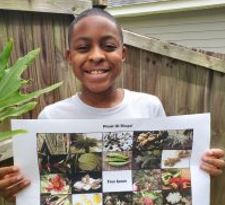
by Marcus Boston Jr. | Jul 31, 2020
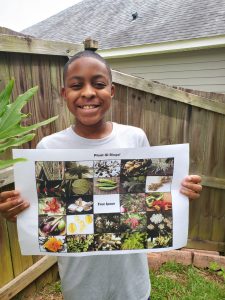
4-H Virtual Plant Science Camp Bingo Game
July 6th of this year was supposed to be the first day of our 4-H Wildlife and Outdoor Recreation Day Camp with Leon and Jefferson Counties participating. Due to the pandemic, all of our Florida 4-H face to face camps were cancelled this summer due to safety concerns for the students and the instructors.
In spite of everything that has taken place since March of this year, there is still some good news! Even though we are in the middle of a pandemic, there is an outdoor classroom in YOUR backyard that has plenty of room for young people and parents to explore. While most youth have spent more time than they probably want to with their families confined, within the four walls of their home, there is no time like the present to explore wildlife and gardening opportunities that await just outside the door. Youth that spend time outside exploring the great outdoors have the unique opportunity to stimulate their senses while engaging in “hands on” educational activities without even knowing it.
4-H provides countless opportunities for youth to gain a better understanding of how all organisms are interrelated and how they can become environmental stewards at home, school, and in the communities in which they live. What are some of the benefits of converting backyards to outdoor classrooms?
I’m glad you asked…here are just a few!
1. Healthy lifestyles are encouraged –
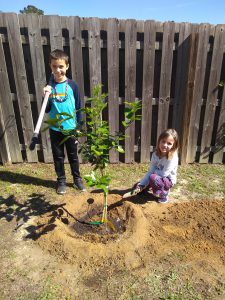
Youth planting an orange tree after participating in Virtual Plant Science Camp
Active time spent outside may help address some of the health issues we are seeing in children today such as obesity, attention deficit disorders, and depression.
2. Nature deficit disorder decline –
Exposing students to nature and allowing them to learn and play outside has shown to foster sensitivity, appreciation, and respect for the environment. It combats “nature deficit disorder” …and it can be a lot of FUN!
3. Critical-thinking skills enhanced –
Exploring what is in the backyard and starting a garden provides opportunities for experiential learning outside of the classroom and enables students to make connections that can be applied to the real world.
4. Responsible action is taken to better the environment –
By exploring outdoors either by planting or just observing nature, youth begin to understand how their decisions and actions affect the environment. It is from this point they can begin to obtain the skills necessary to address complex environmental issues as well as ways we can take action to keep our environment healthy and sustainable for the future.
So even though we are in the midst of a pandemic, there may be opportunities to make lemonade out of the COVID-19 lemons we find ourselves in by unmasking the opportunities that await in our backyards!
For more information about 4-H in your county, find your local UF/IFAS Extension office or visit http://florida4h.org.
*“Please note some pictures were taken prior to our challenges with Covid-19 and we remind people to social distance and wear a mask for the personal safety of self and others.”
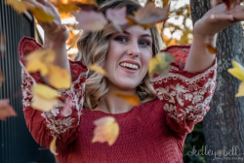
by Prudence Caskey | Jul 29, 2020

Lawson, Santa Rosa Co Senior 4-H Member
Lawson Mathis joined Santa Rosa County 4-H because her cousin, Amanda, had been a 4-H member for years. Lawson’s first experience was a state-wide 4-H event known as 4-H University, held in Gainesville,Florida. She remembers having a broken toe prior to her trip and not knowing anyone but Amanda. Amanda and Trent, another Santa Rosa County 4-H member, had to help her get around Gainesville all week. As Lawson recalls, “they never left me behind either!”
Beginning her 4-H experience at such a significant, week-long event, Lawson could have easily been overwhelmed. Instead, she thrived. Lawson dived into the 4-H program and learned all it had to offer that week. Lawson has been in 4-H ever since moving to Santa Rosa County her freshman year of high school.
“Throughout my entire time in 4-H, no one left me out or left me behind for anything. I have made so many friends and great memories along the way, and I hope I can continue to do so in the future.”
Lawson always been part of the 4-H family. She served every year as a camp counselor at 4-H Camp Timpoochee and made sure that the same attitude of inclusion continued with her campers. Because of 4-H, she has made friends from all over the state as well. She has a caring and giving nature that will be hard to replace. Lawson will be attending Troy University in the fall and majoring in nursing and minoring in American Sign Language. She plans to be a nurse anesthetist upon graduating with her master’s degree.
To find out more information about 4-H programs that can offer essential life skills such as independence, organizational skills, and goal setting, to your children or to volunteer with 4-H, please contact your local UF/ IFAS County Extension Office.
*Please note Lawson’s pictures were taken prior to our challenges with Covid-19 and we remind people to social distance and wear a mask for the personal safety of self and others.*
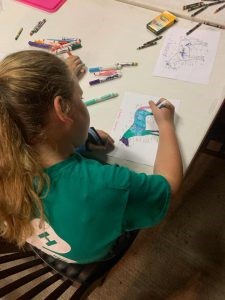
by Rachel Pienta | Jul 17, 2020
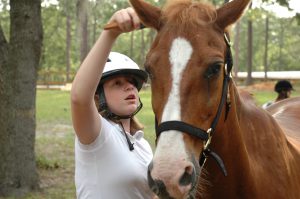
Youth grooming a horse. UF/IFAS Photo: Sally Lanigan.
Across Florida, 4-H clubs have adopted creative ways to stay connected while social distancing
practices are in place. The Wakulla 4-H Bits and Bridles Horse Club, like other 4-H clubs across Florida, ceased in-person activities in mid-March. During the regular program year, the Wakulla 4-H Bits and Bridles Club met monthly for a club meeting that included activities focused on equine science, leadership development, and hands-on skill building. While horseback riding was not a part of every club meeting, most club meetings included some sort of hands-on activity with horses. Club leaders who already had an active Facebook group for their club families, considered how to stay engaged in the face of a prolonged pause in hands-on, face-to-face meetings.
Staying Connected
In Wakulla, the 4-H Bits and Bridles Horse Club has established a welcoming, inclusive environment for both youth with and without horses of their own. After the pause on in-person programming went into effect, Bits and Bridles volunteer leader, Julie Dennis, communicated with youth members and their families via email, sending the following message: “Given the current need to promote safety in our community, we’ll be taking a pause from in-person Bits and Bridles Meetings. Don’t worry though, as soon we can, we’ll get back to our monthly meetings. In the meantime, let’s use our Facebook group as a way to stay connected!”
Julie’s communication was followed by a series of video and photo sharing by adult volunteers and youth members in the private Facebook group for the club, including a challenge to demonstrate a horse-related skill with or without a horse at home. Youth were asked to post, with parent permission or assistance, at least one thing to the Facebook group that they were doing while at home to learn more about horses. The instructions urged youth to post a picture or video engaged in an activity to learn more about horses.
Group members responded by sharing videos demonstrating how to practice several skills with items they had at home: roping livestock and how to use different types of tack. Other youth shared videos demonstrating how to properly care for horse hooves and how to groom a horse. Several youth demonstrated riding activities.
Four Ideas to Stay Engaged with 4-H at Home
Activity ideas were provided to parents to share with youth members. The ideas below were collected by club leader, Julie Dennis, and reviewed by 4-H Agent, Rachel Pienta. Each activity is shared below using language close to or similar to what was shared with 4-H families via email.
Learn a new drill or pattern.
If you have a horse, work on riding in a circle and just the same steps every time at a walk, trot and then collected lope. Dirt lots make a great place to do this because you can retrace your steps and see where your horse has been. Once you master this exercise, work on a serpentine or start by making a small circle and then gradually get bigger. For ideas, get your parents to help you use Pinterest and type in “Horse Drills.” The possibilities are endless. Get someone to take a video and share with us on Facebook!
If you don’t have a horse, you can participate too! Now is the time to get that barrel pattern down. This website has a great summary of the barrel pattern. You can also try your hand at the pole bending pattern. Find some objects at your house (rocks, chairs, whatever you can find outside) and set up these patterns. Then run them yourself & ask a parent to take video for you!
Learn how to clean your tack while practicing the parts of a saddle.
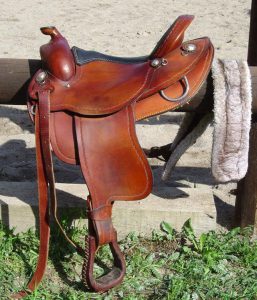
Dry leather can get cracked and brittle.
Spring cleaning! Break out your tack with some good saddle soap and get to cleaning. Remember, this is an important part of being safe when you ride. Dry leather can get cracked and brittle. Anyone who has been around horse shows long enough has seen what happens when an off billet strap breaks. You wind up in the dirt! Not only is this a safety hazard but it can cost you an otherwise very nice run. These are two very good reasons to make sure your tack stays clean.
If you don’t have a horse – there are still ways to learn! There are videos that you can learn from online. Ask a parent to help you search for videos on YouTube.
Start your 4-H Horse Project Record Book!
Now is the time to start on horse projects. A very popular and great project for all kids whether or not you own a horse, is to complete the 4-H Horse Project Record Book. This can be downloaded online. If you don’t have a horse, you can still participate. Make up your horse’s name and then research the information you’ll need to complete each section.
In the case of our club youth, members were encouraged to use online resources to research prices for supplies. Youth without a horse were offered a match with a 4-H Bits & Bridles mentor.
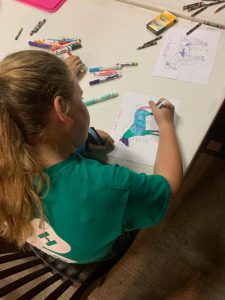
Youth coloring a horse diagram activity sheet.
Build Horse Curriculum into Homeschooling.
The National 4-H program has great curriculum available for all age ranges online. Try building in one horse lesson a week and then keeping a journal about what you’ve learned. This activity can be a great way to keep learning through the summer too!
For more information about 4-H clubs and activities in your community, or to volunteer with 4-H, please contact your local UF/ IFAS County Extension Office.
*“Please note the picture was taken prior to our challenges with Covid-19 and we encourage people to social distance and wear a mask for the personal safety of self and others.”






